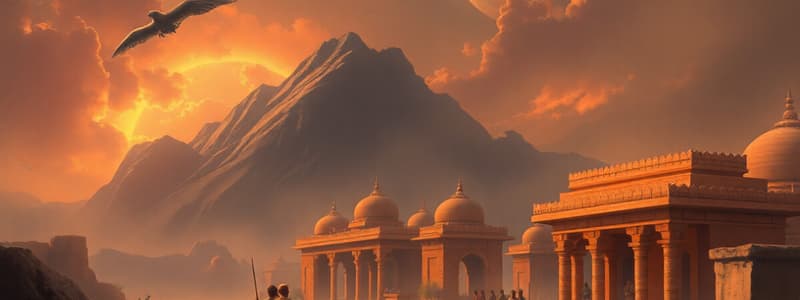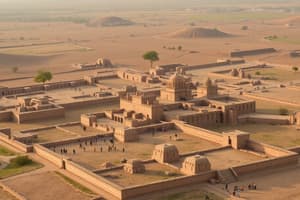Podcast
Questions and Answers
What is another name commonly used for the Indus Valley Civilization?
What is another name commonly used for the Indus Valley Civilization?
- Harappan Civilization (correct)
- Aryan Civilization
- Mohenjo-daro Civilization
- Sumerian Civilization
Which British officer is credited with discovering ancient ruins that led to the identification of the Indus Valley Civilization?
Which British officer is credited with discovering ancient ruins that led to the identification of the Indus Valley Civilization?
- James Rennell
- Sir Charles Masson (correct)
- Alexander Cunningham
- Sir John Marshall
What was the estimated area covered by the Indus Valley Civilization?
What was the estimated area covered by the Indus Valley Civilization?
- 1.3 million square kilometers (correct)
- 500,000 square kilometers
- 800,000 square kilometers
- 2 million square kilometers
Between which years is the Indus Valley Civilization documented to have existed?
Between which years is the Indus Valley Civilization documented to have existed?
Who led the full-scale excavation of Harappa in 1921?
Who led the full-scale excavation of Harappa in 1921?
What was one significant characteristic of the Indus Valley Civilization's infrastructure?
What was one significant characteristic of the Indus Valley Civilization's infrastructure?
What aspect of the Indus Valley Civilization remains under investigation?
What aspect of the Indus Valley Civilization remains under investigation?
Which of the following regions did the Indus Valley Civilization NOT cover?
Which of the following regions did the Indus Valley Civilization NOT cover?
Which characteristic is common to the urban planning of the Indus Valley Civilization?
Which characteristic is common to the urban planning of the Indus Valley Civilization?
What advanced skill did the Indus Valley Civilization demonstrate in metalworking?
What advanced skill did the Indus Valley Civilization demonstrate in metalworking?
Which city is considered the largest discovered site of the Indus Valley Civilization?
Which city is considered the largest discovered site of the Indus Valley Civilization?
What was a unique feature of the Dholavira city layout?
What was a unique feature of the Dholavira city layout?
Which items have been discovered indicating trade between the Indus Valley and other civilizations?
Which items have been discovered indicating trade between the Indus Valley and other civilizations?
Which food sources primarily composed the diet of the Indus Valley Civilization?
Which food sources primarily composed the diet of the Indus Valley Civilization?
What was the principal reason attributed to the decline of the Indus Valley Civilization?
What was the principal reason attributed to the decline of the Indus Valley Civilization?
What form of sanitation was employed in the houses of the Indus Valley Civilization?
What form of sanitation was employed in the houses of the Indus Valley Civilization?
What aspect of trade is evidenced by the standardized weights and measures used in the Indus Valley Civilization?
What aspect of trade is evidenced by the standardized weights and measures used in the Indus Valley Civilization?
Which feature is notable in the architectural structures of the Indus Valley Civilization?
Which feature is notable in the architectural structures of the Indus Valley Civilization?
Flashcards
Indus Valley Civilization
Indus Valley Civilization
One of the most developed ancient civilizations in the world, flourishing in the Indian subcontinent before the arrival of the Aryans, known for its advanced urban planning and sophisticated infrastructure.
Harappan Civilization
Harappan Civilization
Another name for the Indus Valley Civilization, referencing the main site where it was first discovered.
Sir Charles Masson's discovery
Sir Charles Masson's discovery
The discovery of ancient ruins in the Punjab region of India (now Pakistan) by a British officer in 1826, marking the initial recognition of the civilization's existence.
Alexander Cunningham's contribution
Alexander Cunningham's contribution
Signup and view all the flashcards
Excavation of Harappa
Excavation of Harappa
Signup and view all the flashcards
Extent of Indus Valley Civilization
Extent of Indus Valley Civilization
Signup and view all the flashcards
Timeline of Indus Valley Civilization
Timeline of Indus Valley Civilization
Signup and view all the flashcards
Origins of Indus Valley Civilization
Origins of Indus Valley Civilization
Signup and view all the flashcards
Mohenjo-daro
Mohenjo-daro
Signup and view all the flashcards
Harappa
Harappa
Signup and view all the flashcards
Dholavira
Dholavira
Signup and view all the flashcards
Grid System
Grid System
Signup and view all the flashcards
Intricate Drainage Systems
Intricate Drainage Systems
Signup and view all the flashcards
Granaries
Granaries
Signup and view all the flashcards
Trade and Commerce
Trade and Commerce
Signup and view all the flashcards
Cultural Legacy
Cultural Legacy
Signup and view all the flashcards
End of the Indus Valley Civilization
End of the Indus Valley Civilization
Signup and view all the flashcards
Study Notes
Introduction to the Indus Valley Civilization
- The Indus Valley Civilization was one of the world's most developed ancient civilizations, flourishing in the Indian subcontinent before the arrival of the Aryans.
- It was known for its advanced urban planning and sophisticated infrastructure.
- The civilization is also referred to as the Harappan Civilization.
Discovery and Excavations
- Sir Charles Masson discovered ancient ruins in the Punjab region (now Pakistan) in 1826, documenting his findings in 1842.
- Discoveries accelerated in the 1850s during railway construction between Karachi and Lahore.
- Alexander Cunningham surveyed and mapped the Harappa region in 1856, establishing the Archaeological Survey of India in 1861.
- A full-scale excavation of Harappa began in 1921 under Sir John Marshall, Director-General of the Archaeological Survey of India.
- Indian archaeologists, Daya Ram Sahni and Rakhaldas Banerjee, excavated Mohenjo-daro in 1921 and 1922, respectively revealing the existence of the Indus Valley Civilization.
- Discoveries of Indus Valley sites accelerated after Indian and Pakistani independence.
- Approximately 1500 Indus Valley Civilization sites have been discovered, with roughly 925 in India, 575 in Pakistan, and others in Afghanistan.
Extent and Timeline of the Indus Valley Civilization
- The civilization spanned over 1.3 million square kilometers, extending from Jammu and Kashmir in the north to Maharashtra in the south, and from Uttar Pradesh in the east to Balochistan in the west.
- The civilization existed from 3250 BCE to 2750 BCE, with some historians suggesting a timeframe to 1750 BCE based on ash-dating methods.
- Its area was larger than the combined areas of ancient Egypt and Mesopotamia.
- The civilization covered roughly 1400 kilometers north to south and 1600 kilometers east to west.
Origins and Characteristics of the Indus Valley Civilization
- The origin of the Indus Valley Civilization is still being investigated.
- Some believe it was indigenous, while others suggest Sumerian influences due to comparable features.
- The civilization was known for its sophisticated city planning and infrastructure.
- Their writing system remains undeciphered.
- Advanced metalworking skills, including bronze and copper alloying, were used.
- They had knowledge in areas such as measurement, pottery, toy making and mathematics, which facilitated the precise construction of structures and buildings.
Key Cities
- Mohenjo-daro: Located in Sindh province, Pakistan, considered the planned capital.
- Harappa: Located in the Punjab region (Pakistan), a major economic and cultural center.
- Rakhigarhi: Located in Haryana, India, the largest discovered Indus Valley Civilization site.
- Lothal: Located in Gujarat, India, known for its port facilities, highlighting their seafaring capabilities.
- Dholavira: Located in Gujarat, India, noted for its three distinct areas separated by walls, suggesting trade significance in the separate zones.
Urban Planning and Town Planning
- Cities were meticulously planned using a grid system with right-angled streets.
- Main roads were up to 10 meters wide, with smaller connecting roads 3-4 meters wide.
- Houses lined the roads, doorways facing the main streets.
- Sanitation was evident with toilets and drainage systems in each house.
- Dholavira's wooden drainage system is still functional today.
Architecture and Infrastructure
- Impressively constructed buildings, including public baths, granaries, and other structures were characteristic of the civilization.
- Sophisticated drainage systems efficiently removed sewage water.
- Large granaries show a focus on food storage and agricultural production.
- Standardized weights and measures were used for trade.
Trade and Commerce
- Extensive trade with civilizations like Mesopotamia and Egypt.
- Evidence of trade is in the discovery of seashells, ivory, and gemstones from various distant regions.
Culture and Lifestyle
- The Indus Valley Civilization's culture and lifestyle are well-documented.
- A diet focused on wheat, barley, lentils, fruits, and vegetables, with strong agricultural dependence.
- Gold, silver, and precious stones were used for ornaments.
- Cotton and wool were used for clothing, demonstrating their textile knowledge.
End of Indus Valley Civilization
- The cause of the Indus Valley Civilization's decline is uncertain.
- Possible reasons include climate change, environmental problems, overpopulation, invasions, or natural disasters.
- The legacy of the Indus Valley Civilization continues to inspire research and study.
Studying That Suits You
Use AI to generate personalized quizzes and flashcards to suit your learning preferences.
Description
Explore the fascinating history and advancements of the Indus Valley Civilization, one of the world's early urban cultures. This quiz covers its discovery, excavation efforts, and significance in ancient history. Test your knowledge on this remarkable civilization and its contributions to human development.




